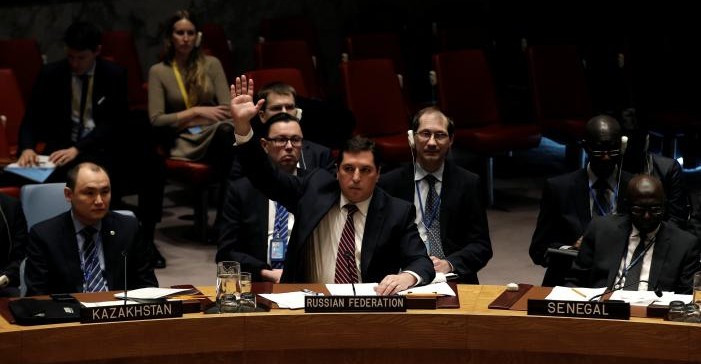Russia blocks any UN action against ongoing chemical attacks by Assad regime
LATEST
WEDNESDAY FEATURE
Turkey’s Erdoğan v. Assad, Kurds, & ISIS — Ready for Raqqa Operation “If Allies Sincere”
UPDATE 1100 GMT: A UN Human Rights Council report on the final stages of the pro-Assad assault to regain all of Aleppo city summarizes:
Between July and December 2016, Syrian and Russian forces carried out daily air strikes, claiming hundreds
of lives and reducing hospitals, schools and markets to rubble. Syrian forces also used chlorine bombs in residential areas, resulting in hundreds of civilian casualties.
As expected, Russia cast its veto on Tuesday to block a UN Security Council resolution imposing sanctions against Syria’s Assad regime over its continued use of chemical weapons.
Russia cast its seventh veto during Syria’s six-year conflict, and China joined it for the sixth time.
The final vote was 9-3 in favor of the resolution, with three abstentions.
The Assad regime has used chemical weapons since at least early 2013, including the sarin attacks near Damascus in August 2013 that killed more than 1,400 people. A UN investigating team finally found the regime responsible for four chlorine attacks from spring 2014, and it has submitted a secret list of political and military officials whom it considers culpable.
But Russian President Vladimir Putin said the draft resolution as “totally inappropriate”. Deputy U.N. Ambassador Vladimir Safronkov described criticism of Moscow in the Security Council “outrageous” and declared that “God will judge you”:
Despite our consistent appeals, the authors chose a politically motivated path, leading to confrontation and adding complexity to the situation, including on our Security Council platform.
They opted for deliberately heating up tensions, being well aware from the very start that this initiative has no chances of being approved at the Security Council.
“For my friends in Russia, this resolution is very appropriate,” US Ambassador Nikki Haley responded. “It is a sad day on the Security Council when members start making excuses for other member states killing their own people. The world is definitely a more dangerous place.”
British UN Ambassador Matthew Rycroft said before the vote: “This is about taking a stand when children are poisoned. It’s that simple. It’s about taking a stand when civilians are maimed and murdered with toxic weapons.”
French UN Ambassador Francois Delattre said the failure by the council to act would “send a message of impunity”. But China’s UN Ambassador Liu Jieyi said it was too early to act because the international investigation was ongoing.
The draft resolution banned the sale or supply of helicopters to the regime, since they drop barrel bombs containing chlorine gas, and imposed targeted sanctions such as a travel ban and asset freeze on 11 Syrian military commanders and officials and on 10 regime and related entities.
TOP PHOTO: Russia’s Deputy Ambassador to the UN, Vladimir Safronkov, vetoes the Security Council resolution punishing the Assad regime for its use of chemical weapons (Mike Segar/Reuters)
Rebels: We Repelled Regime Assaults Near Damascus
Rebels claim they have repelled days of pro-Assad assaults northeast of Damascus, as the regime forces and allies try to break resistance in the capital’s suburbs.
A pro-rebel outlet claimed that 32 pro-Assad troops and militia have been killed in Qaboun, Harasta, and Barzeh.
The Free Syrian Army also said that it captured armored vehicles, including two T-72 tanks.
Regime forces hit Teshreen & Qaboun neighborhoods with 26 elephant missiles since this morning
— FSA News (@FSAPlatform) March 1, 2017
The Assad regime reached high-profile “reconciliation” agreements with Qaboun and Barzeh in early 2014, but the regime appears anxious to establish military control before any significant ceasefire is proposed by political talks.

